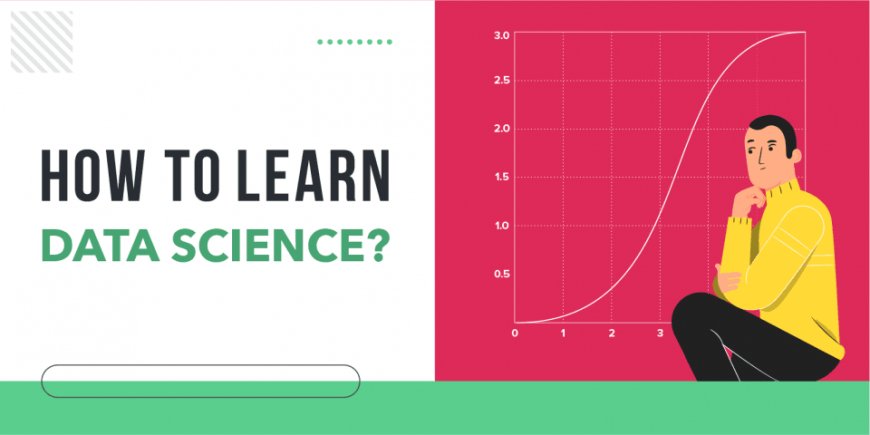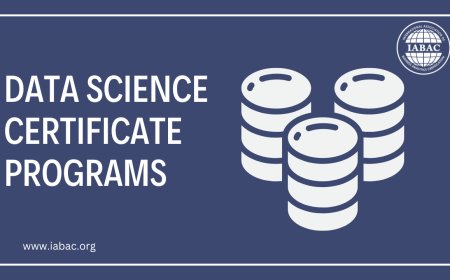How to Learn Data Science: A Friendly Guide for Beginners
Learn data science by mastering programming, statistics, and machine learning techniques through online courses and hands-on projects.

Data science is a rapidly growing field, and learning the necessary skills is crucial for aspiring data scientists. This guide provides an overview of how to learn data science, covering essential steps and highlighting the importance of data science courses.Learning data science is a dynamic and rewarding journey in today's data-driven world. This guide offers a concise introduction to the process of learning data science. From understanding the role of a data scientist to acquiring foundational knowledge, enrolling in data science courses, practicing with real-world datasets, exploring machine learning and data visualization, participating in projects, staying updated with industry trends, and embracing continuous learning, this guide provides a roadmap for individuals eager to dive into the fascinating realm of data science.
Understand the Role of a Data Scientist
Start by gaining a clear understanding of the role of a data scientist. Research the responsibilities, skills, and industry applications to set realistic expectations for your data science journey.Understanding the role of a data scientist is essential for anyone venturing into the field. Data scientists are skilled professionals who extract insights and valuable information from vast amounts of data. They possess a combination of expertise in mathematics, statistics, programming, and domain knowledge to analyze data and provide data-driven solutions to complex problems. Data scientists work on tasks such as data cleaning, exploratory data analysis, building predictive models, and interpreting results. By understanding the role of a data scientist, individuals can align their skills and knowledge to excel in this rapidly evolving field.
Acquire Foundational Knowledge
To succeed in data science, it's essential to have a strong foundation in mathematics, statistics, and programming. Familiarize yourself with concepts such as probability, linear algebra, and algorithms.
To acquire foundational knowledge in data science, consider the following key areas:
-
Mathematics: Develop a solid understanding of mathematical concepts such as linear algebra, calculus, and probability theory.
-
Statistics: Learn statistical concepts including hypothesis testing, regression analysis, and probability distributions.
-
Programming: Gain proficiency in programming languages commonly used in data science, such as Python or R.
-
Data Manipulation: Familiarize yourself with techniques for cleaning, transforming, and manipulating data using tools like SQL, Pandas, or dplyr.
-
Exploratory Data Analysis (EDA): Learn how to explore and visualize data to gain insights and identify patterns or anomalies.
-
Machine Learning: Understand the fundamentals of machine learning, including different types of algorithms, model evaluation, and feature engineering.
-
Data Visualization: Develop skills in creating visual representations of data using libraries like Matplotlib, ggplot, or Tableau.
-
Domain Knowledge: Acquire knowledge in the specific domain you are interested in, as it will help you better understand and analyze relevant data.
-
Communication: Enhance your ability to effectively communicate findings and insights to both technical and non-technical stakeholders.
Enroll in Data Science Courses
Data science courses offer structured learning experiences and comprehensive coverage of key topics. Look for reputable online platforms, universities, or specialized data science academies that offer courses tailored to beginners. These courses often cover topics like statistics, machine learning, data analysis, and programming.
-
Research reputable online platforms, universities, or specialized data science academies that offer data science courses.
-
Look for courses that cover essential topics such as statistics, machine learning, data analysis, and programming.
-
Check the qualifications and expertise of the instructors delivering the courses.
-
Consider the course format, whether it is self-paced or instructor-led, to align with your preferred learning style and schedule.
-
Read reviews or testimonials from past participants to gauge the quality and effectiveness of the courses.
-
Evaluate the course syllabus to ensure it covers the necessary skills and knowledge you want to acquire.
-
Check if the course provides practical assignments, projects, or case studies for hands-on learning.
-
Look for courses that offer certifications upon completion to enhance your credibility and marketability.
-
Consider the flexibility and accessibility of the course platform, as well as any additional resources or support provided.
-
Take advantage of free or trial versions of courses before committing to a full enrollment.
Learn Programming Languages
Proficiency in programming is crucial for data scientists. Focus on learning programming languages commonly used in data science, such as Python or R. These languages provide extensive libraries and tools specifically designed for data analysis and machine learning.
To learn programming languages for data science, focus on the following key points:
-
Python: Learn Python, a versatile and widely-used language in data science, known for its simplicity and extensive libraries such as Pandas, NumPy, and scikit-learn.
-
R: Explore R, a language specifically designed for statistical analysis and data visualization. It offers a wide range of packages like dplyr, ggplot2, and caret.
-
Programming Concepts: Understand programming fundamentals, including variables, data types, loops, conditional statements, functions, and object-oriented programming (OOP) concepts.
-
Data Manipulation: Practice data manipulation techniques using Python's Pandas or R's dplyr library. Learn how to clean, filter, reshape, and merge datasets.
-
Data Visualization: Utilize libraries like Matplotlib, Seaborn, ggplot2, or Plotly to create meaningful visualizations that effectively communicate insights from data.
-
Database and SQL: Familiarize yourself with relational databases and SQL (Structured Query Language) to interact with databases, retrieve data, and perform basic data manipulation tasks.
-
Web Scraping: Gain knowledge of web scraping techniques using libraries like BeautifulSoup or Scrapy to extract data from websites.
-
Version Control: Learn to use version control systems like Git to manage your code, collaborate with others, and track changes.
-
Practice and Projects: Apply programming concepts by working on practical exercises and projects. Practice implementing algorithms, data analysis, and visualization tasks using real-world datasets.
-
Online Resources and Courses: Utilize online platforms such as Codecademy, DataCamp, or free resources like tutorials and documentation to learn programming languages and their application in data science.
Practice with Real-World Datasets
Apply your knowledge by working on real-world datasets. Platforms like Kaggle provide access to diverse datasets and host data science competitions, allowing you to practice your skills, learn from others, and receive feedback. To effectively learn data science, it is crucial to practice working with real-world datasets. Here's how you can gain practical experience and enhance your skills:
-
Access publicly available datasets from reputable sources.
-
Clean and preprocess the data to handle missing values, outliers, and inconsistencies.
-
Conduct exploratory data analysis (EDA) to gain insights and understand the data's characteristics.
-
Engage in feature engineering to transform raw data into meaningful features.
-
Apply various machine learning algorithms to the dataset for prediction or classification tasks.
-
Evaluate model performance using appropriate metrics and techniques.
-
Create visualizations to effectively communicate findings and patterns within the data.
-
Undertake data science projects or case studies that simulate real-world scenarios.
-
Collaborate with others in the data science community to gain different perspectives and feedback.
-
Continuously seek new datasets and projects to challenge and refine your skills.
Explore Machine Learning
Machine learning is at the core of data science. Delve into supervised and unsupervised learning algorithms, model evaluation techniques, and feature selection methods. Implement machine learning algorithms using libraries like Scikit-learn or TensorFlow.
Exploring machine learning is a crucial aspect of learning data science. Machine learning involves algorithms that enable computers to learn patterns and make predictions from data. By studying and implementing various supervised and unsupervised learning algorithms, understanding model evaluation techniques, and exploring feature engineering and selection methods, you can gain a deeper understanding of how machine learning algorithms work and their applications in solving real-world problems. Through hands-on practice and experimentation, you'll develop the skills to build and optimize machine learning models that can extract valuable insights from data.
Develop Data Visualization Skills
Developing data visualization skills is essential in data science. Data visualization allows you to effectively communicate insights and patterns found in data through visual representations such as charts, graphs, and interactive dashboards. By learning visualization libraries like Matplotlib, Seaborn, or Tableau, you can create visually appealing and informative visualizations that enhance understanding and aid decision-making. Practice selecting the appropriate visualizations for different types of data and explore techniques to convey complex information in a clear and compelling manner. Developing strong data visualization skills will enable you to effectively communicate findings and tell compelling stories with data.
Participate in Data Science Projects
Undertake personal data science projects to demonstrate your skills and build a portfolio. Choose projects aligned with your interests and showcase your ability to solve real-world problems using data science techniques.
Participating in data science projects is a valuable way to apply your skills and gain practical experience. By actively engaging in projects, you can tackle real-world problems, work with diverse datasets, and apply data science techniques to derive insights and solutions. Collaborating with others in the data science community or within organizations allows you to learn from different perspectives and enhance your problem-solving abilities. Participation in projects also helps build a portfolio showcasing your practical expertise, which can be invaluable when seeking job opportunities or advancing in your data science career.
Continuously Learn and Adapt
Continuously learning and adapting is a fundamental principle in the field of data science. With the rapid advancements and evolving landscape, it is crucial to embrace a mindset of lifelong learning. Stay curious, seek out new resources, and explore emerging techniques, tools, and methodologies. Engage in online courses, attend workshops, and participate in webinars or conferences to expand your knowledge and skill set. Be open to new challenges and projects that push you out of your comfort zone, as they provide valuable opportunities for growth. Adaptability is key in data science, as it allows you to stay relevant, leverage new technologies, and tackle complex problems effectively. By embracing continuous learning and adaptation, you can thrive in this dynamic field and remain at the forefront of data science advancements.
Learning data science requires a structured approach that includes acquiring foundational knowledge, enrolling in data science courses, mastering programming languages, practicing with real-world datasets, exploring machine learning, developing data visualization skills, participating in projects, staying updated with industry trends, and continuously learning and adapting. By following these steps and emphasizing the importance of data science courses, you can build a solid foundation and embark on a successful journey as a data scientist.











































